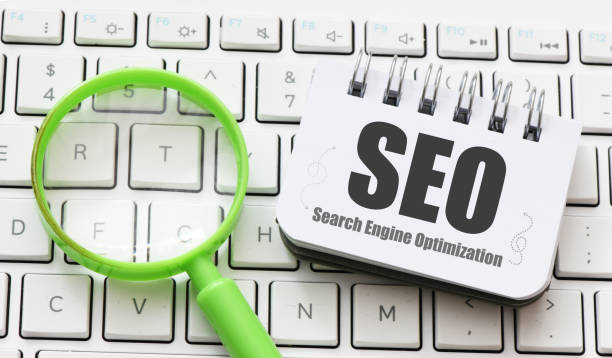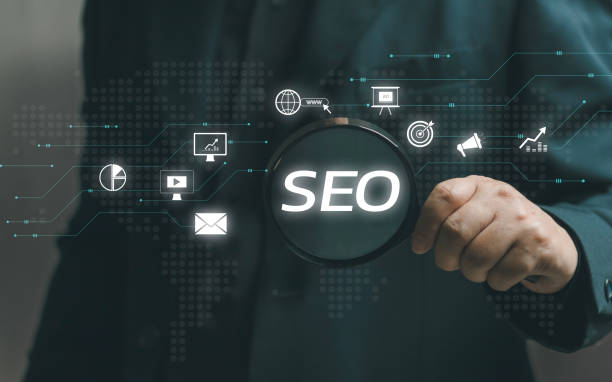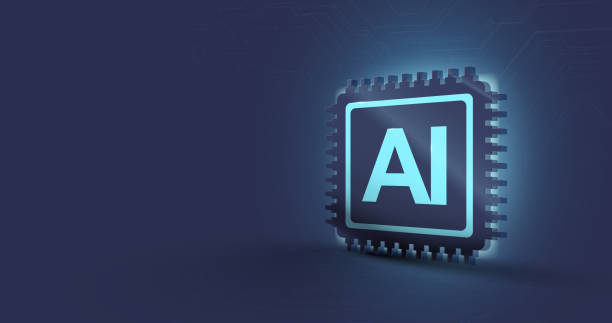What is SEO and Why is it Vital for Your Business?

In today’s digital world, #online_presence is only half the equation; the other half is #visibility.
SEO, or Search Engine Optimization, is precisely designed for this purpose: to rank your website higher in search engine results like Google.
This process is a set of techniques and strategies whose ultimate goal is to improve the ranking of your web pages.
The importance of SEO is no longer hidden from anyone.
In the past, many businesses simply sufficed with creating a website, but today it has become clear that a website that isn’t seen is practically useless.
Imagine millions of web pages on the internet; SEO helps you stand out among them and attract the attention of target users.
This is especially vital for small and medium-sized businesses that want to gain a share of the online market in competition with larger brands.
One of the key aspects of SEO is understanding how search engine algorithms work.
These algorithms are constantly changing and evolving, and for this reason, up-to-date specialized knowledge in this field is of high importance.
Without SEO, your website’s organic traffic will drastically decrease, which means losing many potential customers.
Organic traffic is not only free, but it usually consists of users who are actively looking for your services or products, which leads to a much higher conversion rate.
In fact, Search Engine Optimization is a long-term investment that brings stable and reliable results.
This approach allows you to continuously be exposed to your audience without the need for Pay-Per-Click (PPC) costs.
Ultimately, SEO not only helps increase visibility, but also enhances user trust and credibility in your brand.
In subsequent chapters, we will delve into more details of practical SEO techniques and strategies that every business needs for its online success.
Tired of losing customers due to poor e-commerce website design? With Rasawwb, solve this problem forever!
✅ Increase sales and conversion rate of visitors to customers
✅ Smooth and engaging user experience for your customers⚡ Get Free Consultation
Types of SEO in the Web Optimization Journey

SEO is a broad concept divided into different sections, each with a specific goal for improving site ranking.
Understanding these types is essential for anyone who intends to optimize their website.
The three main pillars of SEO include On-Page SEO, Off-Page SEO, and Technical SEO.
On-Page SEO refers to all optimizations performed within your website, including content optimization, keywords, title tags, and meta descriptions.
The goal of this type of SEO is to ensure that your content is not only appealing to users but also understandable and relevant to search engines.
This section includes explanatory and guidance content that directly helps users.
Off-Page SEO, conversely, involves activities performed outside your website to increase its authority and credibility.
The main part of Off-Page SEO is Backlink Building; meaning receiving links from other websites to your website.
The more numerous and higher quality the backlinks, the more credible search engines will consider your website.
This requires a specialized and time-consuming strategy, which can include producing engaging news content to attract media attention.
Technical SEO also addresses the technical aspects of your website that affect its crawlability and indexability by search engines.
This includes optimizing site loading speed, mobile compatibility, URL structure, and fixing site errors.
Understanding and correctly implementing these three types of SEO provides a comprehensive approach for success in search engine optimization and serves as a step-by-step tutorial for every website administrator.
On-Page SEO and the Importance of Content

On-Page SEO is the beating heart of every successful optimization strategy.
This section includes all optimizations you directly perform on your website’s pages to make them more attractive and understandable for both users and search engines.
Among the most important elements of On-Page SEO are keywords.
Finding appropriate keywords and optimally using them in titles, meta descriptions, headings (H1, H2, H3), and the main content text is one of the first steps.
Your content should not only include keywords but also possess high quality, topical relevance, and real value for the user.
This is where the production of thought-provoking and in-depth content can drive significant organic traffic to your site and improve user experience.
Beyond keywords, optimizing images (using appropriate Alt tags), user-friendly and descriptive URL structures, and using internal links to connect related pages are all vital components of On-Page SEO.
Internal links help search engines better understand your site’s structure and distribute authority (Link Equity) throughout the site.
Furthermore, optimizing page loading speed through image compression and code optimization improves user experience, which is itself an important ranking factor.
An analytical approach to existing content and identifying improvement opportunities can significantly boost your On-Page SEO performance.
Optimizing titles and meta descriptions is also of particular importance, as they are the first things users see in search results and can influence the click-through rate (CTR).
| On-Page SEO Element | Importance for SEO | Key Points |
|---|---|---|
| Keywords | Basis for search engine understanding of content | Keyword research, natural usage, avoiding keyword stuffing |
| Page Title (Title Tag) | Most important ranking factor, first user impression | Includes main keyword, short and attractive, less than 60 characters |
| Meta Description | User attraction and CTR increase | An attractive summary of content, includes keyword, max 160 characters |
| Headings (H1-H6) | Content structuring, readability, and topic identification | H1 only once per page, logical use of H2-H6 |
| Internal Linking | Increasing Authority and aiding indexing | Link to relevant pages, use appropriate anchor text |
Off-Page SEO and the Power of Backlinks

Off-Page SEO refers to all activities performed outside your website to increase its credibility and Domain Authority in the eyes of search engines.
The most important element in Off-Page SEO is undoubtedly backlinks.
A backlink means a link given from another website to your website.
Search engines consider backlinks as a vote of confidence from other websites.
The greater the number and quality of these votes, the more your website’s credibility will increase in the eyes of Google and other engines, resulting in a better ranking in search results.
The backlink building strategy must be precise and natural.
Spam links or links coming from low-quality sites can harm your site instead of helping.
Building quality backlinks requires specialized approaches, including creating entertaining and shareable content, establishing relationships with bloggers and influencers, and participating in relevant online communities.
It is important that links are obtained from highly reputable websites relevant to your business domain.
For example, a backlink from a reputable news website in your industry is far more valuable than dozens of backlinks from irrelevant and low-authority blogs.
In addition to backlinks, other factors such as social media shares (Social Signals), brand mentions (even without links), and presence in reputable directories can also help your Off-Page SEO.
A comprehensive analysis of competitors’ backlink profiles can also be valuable guidance for your strategy.
Are you tired of losing business opportunities due to not having a professional corporate website?
Rasawwb, with professional corporate website design, helps you:
✅ Build a powerful and trustworthy image for your brand
✅ Convert website visitors into loyal customers
⚡ Get a free consultation now!
Technical SEO and Website Infrastructure

Technical SEO is the backbone of any website, often overlooked by users, but vital for search engines.
This part of SEO addresses the technical aspects of your website that affect how it is crawled and indexed by search engines.
Without proper Technical SEO, even with the best content and strongest backlinks, your site might not appear correctly in search results.
Website loading speed is one of the most important factors in Technical SEO.
Both users and search engines care about speed; slow websites can lead to high bounce rates and poor user experience.
Optimizing images, using caching, and optimizing HTML/CSS/JavaScript codes are among the measures that help improve speed.
In addition to speed, the mobile-friendliness of the website is also of great importance, as a large portion of searches are performed via mobile devices.
Google uses a Mobile-First Indexing approach, meaning it prioritizes the mobile version of your site for indexing and ranking.
Other important elements of Technical SEO include the structure of XML Sitemap to help search engines discover pages, proper use of the robots.txt file for crawl control, implementation of SSL certificate for security (HTTPS), and handling 404 errors and correct 301 redirects.
A complete analysis of your site’s technical aspects can identify flaws and provide guidance for improving the overall performance of Search Engine Optimization.
This is a specialized field that usually requires technical knowledge.
Content Production for SEO: Attracting Users and Search Engines

Content is king, and this statement never gets old in the world of SEO.
Producing high-quality and relevant content is the cornerstone of any successful SEO strategy.
But what exactly does ‘quality’ content mean? Quality content is content that not only answers users’ questions but also addresses their hidden needs.
This content can be in the form of educational, explanatory, analytical, news, thought-provoking, and even entertaining content.
The main goal is for the user to spend more time on your site and become a loyal customer.
Correct and natural use of keywords, without overdoing it, is one of the most important aspects of content production for SEO.
Furthermore, content should be structured and readable.
Using headings (H1, H2, H3), short paragraphs, lists, and relevant images greatly enhances readability.
Also, Evergreen Content, which does not lose its value over time, plays a very important role in long-term SEO.
This type of content continuously attracts organic traffic to your site and requires less frequent updates.
Finally, Content Promotion is as important as its production.
Sharing your content on social media, sending email newsletters, and even connecting with other bloggers can help increase the visibility of your content and earn valuable backlinks, all of which ultimately lead to the improvement of your website’s SEO.
Measuring SEO Success: Key Metrics and Analytical Tools

After implementing your SEO strategies, it’s important to be able to measure the effectiveness of your efforts.
Without measurement, you cannot understand what works and what needs improvement.
Analytical tools like Google Analytics and Google Search Console are essential and provide comprehensive guidance for understanding your site’s performance.
There are many key metrics that need to be monitored.
Organic Traffic is the first and most important metric; it indicates the number of users who have entered your site through search engines.
An increase in this number is a sign of your successful SEO efforts.
In addition to organic traffic, you should also pay attention to Keyword Rankings.
Knowing what position your site holds for which keywords provides a clear view of your progress.
Click-Through Rate (CTR) in search results, Bounce Rate, and Time on Page are also important metrics that indicate user experience and content quality.
A precise analysis of these metrics can help you identify weaknesses and adjust your Search Engine Optimization strategy.
Tools like Ahrefs and Semrush are also very useful for competitor analysis, finding keywords, and checking backlinks, providing you with specialized data.
This data can help you with educational and strategic decisions.
| SEO Metric | Definition | Importance for Analysis |
|---|---|---|
| Organic Traffic | Visitors from search results | Overall indicator of SEO success |
| Keyword Ranking | Site’s position for specific keywords | Progress in keyword targeting |
| Click-Through Rate (CTR) | Percentage of clicks from search impressions | Effectiveness of title and meta description |
| Bounce Rate | Percentage of users who leave a page without interaction | Content quality and user experience |
| Time on Page | Duration a user stays on a page | Attractiveness and usefulness of content |
The Future of SEO and Artificial Intelligence: Upcoming Developments

The world of SEO is not static and is constantly evolving.
With rapid advancements in Artificial Intelligence (AI) and machine learning, the future of SEO is increasingly intertwined with these technologies.
Google algorithms like RankBrain, BERT, and Panda all use AI to better understand searches and deliver more relevant results.
This means that SEO is no longer just about optimizing for keywords, but rather a deeper understanding of search intent and providing content that answers that intent has become crucial.
AI helps search engines analyze content more semantically, not just based on keywords.
Hence, in the future of SEO, producing very high-quality, comprehensive, and user-centric content that fully answers user questions will be more important than ever.
Explanatory and analytical content that addresses a topic from various perspectives can be more successful in this new environment.
Also, Voice Search and Visual Search are growing, creating new challenges and opportunities for SEO practitioners.
Optimizing for voice search requires focusing on longer keywords and conversational language.
AI tools can also assist SEO professionals in data analysis, identifying hidden keywords, and even generating initial content.
Understanding these developments and preparing SEO strategies for the future is critically important.
Research shows that 80% of customers trust companies with professional websites more. Does your current website inspire this trust?
With Rasawwb’s corporate website design services, solve the problem of lack of customer trust and weak online image forever!
✅ Create a professional image and increase customer trust
✅ Attract more sales leads and business growth
⚡ Get free consultation
Common SEO Mistakes and Avoidance Strategies

On the path to Search Engine Optimization, common mistakes exist that can render your efforts ineffective or even harm your website’s ranking.
Identifying and avoiding these mistakes is essential for success in SEO.
One of the most common errors is excessive use of keywords (Keyword Stuffing).
In the past, over-repetition of a keyword might have improved ranking, but today, Google’s smart algorithms identify this practice and penalize the site.
Your content should be natural and user-friendly, not robotic.
Lack of mobile optimization is also a major mistake, as the majority of internet users use their smartphones, and Google places great importance on mobile-friendly sites.
Ignoring site loading speed, using spam links or buying low-quality backlinks, and not regularly updating content are other common mistakes.
Spam links are not only useless but can also lead to Google penalties.
Outdated and obsolete content can also lower your ranking.
Producing educational content and constantly updating it is essential for maintaining relevance and credibility.
Also, many websites suffer from inappropriate URL structures, duplicate or short meta descriptions, and non-use of XML sitemaps.
A comprehensive analysis of your website’s current SEO status and following expert guidance can help you identify and correct these mistakes.
Continuous learning and adapting to algorithm changes are key to preventing these errors.
Conclusion and Next Steps Towards Sustainable SEO

Throughout this article, we covered various aspects of SEO, from its definitions and importance to types of On-Page, Off-Page, and Technical SEO, as well as content production, measuring success, and the future of this field.
It is clear that SEO is not a one-time process, but rather a continuous and dynamic strategy that requires constant attention and updating.
Success in Search Engine Optimization not only helps increase organic traffic and business visibility but also leads to increased brand credibility and ultimately growth in sales and profitability.
To stay at the top of search results, you must constantly adapt to changing search engine algorithms and prioritize user needs.
Your next steps for sustainable SEO include: conducting continuous keyword research to identify new opportunities, consistently producing high-quality and relevant content that answers user questions, technical optimization of your website to ensure proper crawling and indexing, and building natural and quality backlinks from authoritative sources.
Additionally, continuous analysis of SEO performance using analytical tools and ongoing self-education in this field will help you always stay one step ahead.
SEO is a long-term investment that, with patience and effort, will bring extraordinary results and will guide your digital path.
Frequently Asked Questions
| Question | Answer |
|---|---|
| What is SEO? | SEO, or Search Engine Optimization, is the process of increasing the quality and quantity of website traffic by improving a site’s ranking in natural (organic) search engine results like Google. |
| What are the main types of SEO? | SEO is divided into three main categories: On-Page SEO, Off-Page SEO, and Technical SEO. |
| What does On-Page SEO include? | On-Page SEO includes optimizing elements within the website, such as keywords, page title (Title Tag), meta description, content, URL structure, images, and internal links. |
| What is Off-Page SEO? | Off-Page SEO refers to activities outside the website that help improve its ranking, such as Backlink Building, social media marketing, and Brand Mentions. |
| What is Technical SEO? | Technical SEO involves optimizing the technical aspects of a website to help search engines crawl and index it better. This includes site speed, mobile-friendliness, site structure, Sitemaps, and the Robots.txt file. |
| What role do Keywords play in SEO? | Keywords are phrases that users enter into search engines. Proper and targeted use of relevant keywords in content and site elements helps search engines understand your page’s topic and display it for relevant searches. |
| What is a Backlink and why is it important? | A backlink, or inbound link, is a link from one website to another. Backlinks act as a ‘vote of confidence’ from other sites for search engines and play a crucial role in a site’s credibility and ranking increase, especially if they are from reputable sites. |
| What impact does quality content have on SEO? | High-quality, relevant, comprehensive, and unique content not only attracts and retains users but also signals to search engines that your page is valuable. This helps improve ranking, reduce Bounce Rate, and increase user time on site. |
| Why is site loading speed important for SEO? | Site loading speed is an important ranking factor for Google. Faster sites provide a better user experience, have lower bounce rates, and are preferred by search engines. |
| Is SEO a one-time process? | No, SEO is a continuous and long-term process. Search engine algorithms are constantly changing, competition is increasing, and site content also needs updating. Therefore, SEO requires continuous monitoring, analysis, and optimization. |
And other services of Rasawwb Advertising Agency in the field of advertising
Smart Marketplace: A creative platform for improving customer behavior analysis with custom programming.
Smart Marketplace: A combination of creativity and technology to increase click-through rates through intelligent data analysis.
Smart Marketing Automation: A dedicated service for growth in campaign management based on user experience customization.
Smart Brand Identity: Transform campaign management with precise audience targeting assistance.
Smart Google Ads: Designed for businesses looking to increase click-through rates through key page optimization.
And over hundreds of other services in the field of internet advertising, advertising consultation, and organizational solutions
Internet Advertising | Advertising Strategy | Advertorials
Sources
An article about improving SEOWhat is SEO? (Modireweb)What is Website Optimization?What is On-Page SEO?
? Are you ready for your business to leap forward in the digital space? Rasawwb Afarin Digital Marketing Agency offers a wide range of professional services, including e-commerce website design and comprehensive SEO strategies, to help you achieve your online marketing goals and establish a strong, successful presence on the internet.
📍 Tehran, Mirdamad Street, next to Bank Markazi, Southern Kazeroon Alley, Ramin Alley, No. 6




